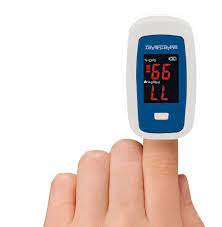In a few weeks, the US government will end COVID-19 emergency declarations, meaning that the pandemic will officially be over.
Hey, that wasn’t so bad, was it?
You know, aside from the years of death and madness and depression and trauma and societal unraveling, it wasn’t that big of a deal, right?
Ahem.
In any case, the pandemic provoked behavioral changes that we could not have imagined in 2019, like carrying a mask everywhere or washing your hands incessantly or sticking those weird clamp things on your fingers to check your oxygen levels.
Those were called pulse oximeters, by the way, and they were “a crucial tool for tracking the health of COVID-19 patients.”
Yes, pulse oximeters helped gauge the severity of the illness. They were a sterling example of medical knowledge, technological innovation, and white supremacy.
OK, that last one is an unpleasant addendum. But unfortunately, it is true.
You see, pulse oximeters were often “inaccurate when measuring oxygen levels in people with dark skin tones.”
This is because medical products are often developed using data from “trials that involve primarily white individuals.” As a result, pulse oximeters were designed to work well on white people. For the rest of us, however, not so much.
Experts say “it’s not possible to know how much pulse oximeters have contributed to the disproportionate impact of COVID-19 on people of color.” But considering Latinos and blacks “experienced higher rates of hospitalization and death from COVID-19 compared to white people,” it was likely a factor.
Of course, the assumption that white is the most common skin color, or even the only skin color, has a long history in America.
Until the 1960s, Crayola crayons had a pinkish hue that was labeled, “flesh.”
And as we all know, band-aids don’t come in dark brown, which has “long been a point of contention among people of color who have questioned why white skin is the default shade for a range of flesh-toned products, including nude bras and other garments.”
Why, indeed?
But you will be happy to know that the baseline for the human experience is not just white people, but white men specifically.
We’re not just talking about the fact that white men hold over 60% of all elected offices, despite being just 30% of the population.
Or the fact that most films and TV shows focus on a white male protagonist.
Or that white men are apparently the only group whose opinions matter, and that the rest of us are pretty much at their mercy.
No, I’m talking about air conditioning.
Yes, you heard me correctly.
Back in the 1960s, when air conditioning became common in office buildings, engineers needed a standard to ensure the temperature would be comfortable.
And of course, they based this standard on the preferences of white men in wool suits — the Don Drapers of the era.
These temperatures “favor the thermal preferences of men,” and are the baseline to this day, which is why women in office settings often feel like they’re freezing.
It’s because they are.
But don’t worry. Those white guys in suits are perfectly comfortable.
It seems that “everything in our society is centered around preserving white male power regardless of white male skill or talent.” And this is not just annoying. It’s also detrimental to our nation.
You see, the “rewarding of white male mediocrity not only limits the drive and imagination of white men; it also requires forced limitations on the success of women and people of color in order to deliver on the promised white male supremacy.”
When everyone just assumes that a certain group should be in charge (i.e., white guys), members of that group don’t have to excel to succeed, while members of other groups struggle, and the culture as a whole stagnates.
In this way, “white male mediocrity harms us all.”
Unfortunately, this situation is unlikely to change any time soon.
But hey, at least the pandemic is over.





